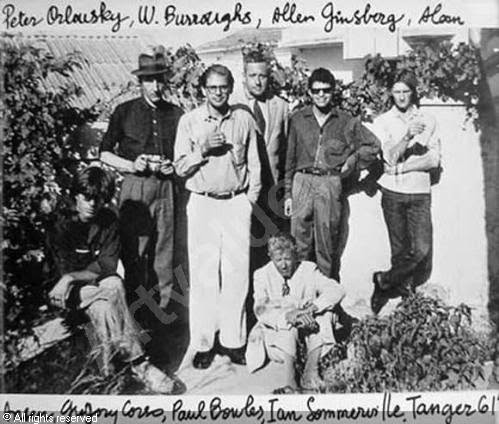Now it’s Robert Fripp’s turn, born today in 1946. Besides
playing on albums by the featured artists of the last three days, and
collaborating on albums with Eno, Fripp has shown up memorably on David Bowie
albums, songs by The Roches, and been the force behind various experimental
outfits, notably The League of Gentlemen. But what first brought him to my
attention—in 1973—was his band King Crimson, formed in 1969 and an evolving,
eclectic group of which Fripp is the only constant member.
In 1973, King Crimson, led by Fripp, released the album
Larks’ Tongues in Aspic, and I was tempted to choose the song “Exiles,” long
one of my favorites of that era, as my song of the day. But then I felt
conflicted because, if I’m going back to the Seventies (again!), I have to
admit that Lizard (1970) is the album like none other that, to me, demonstrates
Fripp’s odd genius at composition, with also some standout moments of musicianship.
Then there’s “Formentera Lady/A Sailor’s Tale” from Islands (1971). All these
albums and songs would send me off into autobiographical reveries, I have no
doubt.
 |
| Fripp, Levin, Bruford, Belew |
So let’s avoid that and let’s go with something from the
1980s, when Fripp formed a band that contained drummer Bill Bruford (birthday boy tomorrow), formerly
and notably of Yes, who was part of King Crimson from Larks’ Tongues onward to
the most recent, 21st century, incarnation, Adrian Belew, who plays on Talking
Heads’ Remain in Light and subsequent tour (which I remember quite vividly),
and Tony Levin, he of the bottomless bass and keen Stick manipulations. It’s a
great band, the best King Crimson line up, and the albums they made from
1980-84 deserve to be commemorated here on Mr. Fripp’s birthday.
I didn’t get to see that band, unfortunately, but rather the
21st century version when, on three separate occasions, they played near me in
CT, twice in New Haven, once in Hartford. The opportunity to hear Fripp play
live should never be passed up. And so, for today’s song, I’ve chosen a live video
of the Eighties Crimson performing “Sartori in Tangier” from the 1982 album
Beat. I’ve always preferred that record to the more famous, because first of
the new line-up, Discipline (1980). Beat takes its themes from “the Beat
generation” writers—Kerouac and Ginsberg and Burroughs in particular—and 1982
was the time when I was most steeped in those writers, discovering most of
their works in the early Eighties myself. So, there’s that.
About the title: Satori in Paris is a book by Kerouac, “satori”
being a Buddhist idea: “awakening.” A key concept for the Beats as the
standard-issue version of life is like being asleep and it takes some major
epiphany to wake one up to the reality of being. Tangier was a notorious
destination for the Beats, particularly Burroughs, and Ginsberg and Kerouac
visited him there, in 1957, to help him get his manuscript of Naked Lunch into
condition. The album prints the title as “Sartori in Tangier”—which is perhaps
a misprint or perhaps a joke, as “sartori” might refer to choosing clothing appropriate
to the region.
In any case, it’s an instrumental so I have nothing to say
about its words, other than the title. On the video it’s great to watch Fripp
play—though seated as usual, he actually moves around a bit. The sound he gets
from his guitar is characteristic here. It’s that great, unmistakable treated
sound of the guitar, using sustain in particular, to make that steady whine
that sounds almost like shrieking, when he wants it to. Here it feels more
ethereal, like a soul striving for the pure empyrean, with some Moroccan
touches. Levin on Stick offers a great intro and interplay, and both Bruford and
Belew are on drums. Bruford is probably my favorite of all the prog-rock
drummers and that’s largely because of his ability to play so well with Fripp
and his many time changes.
I still remember the article I first read on King Crimson in
Circus magazine in 1973. I liked it because it made my mouth water for the
album called In the Court of the Crimson King and intrigued me to hear In the
Wake of Poseidon and Lizard and Islands. The new album, Larks’ Tongues, was the
cause of the article but I wanted to hear the older albums first, and I did. I
collected them all back then and I still find them intriguing, not only because
Pete Sinfield wrote interesting, florid and memorable lyrics, but mainly
because Robert Fripp’s idea of the guitar is so singular. His riffs on Bowie
songs like “Heroes” and “Teenage Wildlife” are stand-outs to me, and, in
general, his contribution is always notable.
Hats off to Mr. Fripp.





1 comment:
Very interesting post! Concise and filled with relevant information!
Post a Comment